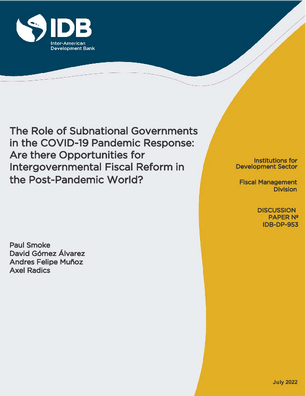The Role of Subnational Governments in the Covid-19 Pandemic Response: Are There Opportunities for Intergovernmental Fiscal Reform in the Post-Pandemic World?
Date
Jul 2022
In early 2020, once the severity was recognized on a global scale, the COVID-19 pandemic quickly became the most immediately pressing crisis. In addition to the general demands the pandemic created for strong and competent national and international response, it also raised numerous issues and generated tensions around the sharing of responsibilities and resources among levels of governments in many countries around the world. A number of comparable health and economic issues have emerged fairly universally, but they have manifested in different ways and the responses and results have been diverse across and within countries. This monograph summarizes available information about how the pandemic has affected fiscal decentralization around the world, focusing on five Latin American countries: Argentina, Brazil, Colombia, Mexico, and Peru. It briefly characterizes the intergovernmental fiscal systems in these countries, provides an overview of the known impacts of the pandemic and summarizes available information on government responses to the pandemic, both national and those undertaken by subnational governments with national support or more independently. The conclusions draw lessons from regional and global experiences about if and how post-pandemic policies might be developed to improve the intergovernmental fiscal system in particular countries.




